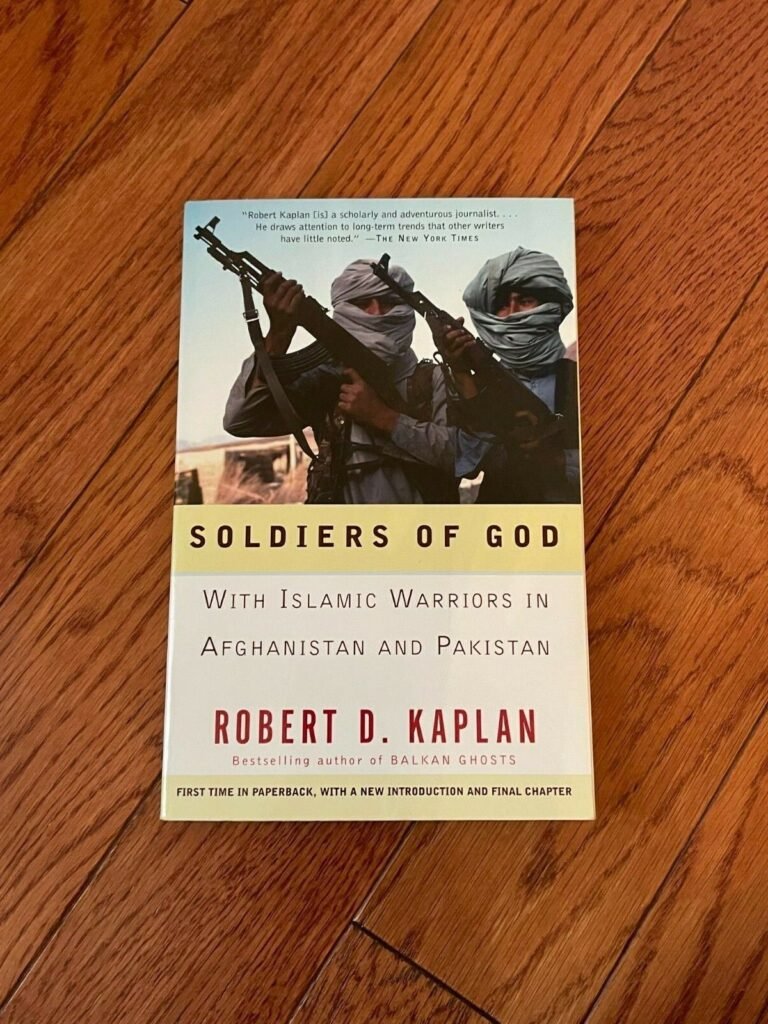Soldiers of God Book Review
Many of us were first introduced to the idea of Afghanistan through the words of Tagore in Kabuliwala where a large-hearted and kind dry-fruits seller captured the imagination of a tiny girl in Calcutta. After that, it has just been through the lens of academics-international relations or regional security, sometimes through Khaled Hosseini.
However, Kaplan manages to give us everything in this book through a first-hand account of living with the Mujahideens. His blend of past, present, and future through a wonderful analysis of history, geography, culture, and geopolitics provide us with a vivid screening of the phenomenon that is Afghanistan.
KAPLAN IN AFGHANISTAN
I have read three books by Kaplan, and his undulating ways of research and his knowledge of international affairs make his books interesting. This amazing travel journal is no different. Kaplan put up with the dangers of war-riddled Afghanistan, fighting against the intimidating Soviets. in the 1980s and living amongst the fierce mujahadeen, he gives us the true story behind the serene mountains of Afghanistan.
This book includes the background for the war, modern Afghani history, Afghani history during British imperial times, and even some legends. Also included is an extended analysis of the main ethnic group in the resistance, the “Pathans” or “Pashtoons.” They are a fierce and fearsome bunch, relentless, tribalist, entirely male-centric, whose members went on to form the Taliban. Kaplan spends much time with them and gets to know them fairly well.
In this book, Kaplan unravels astonishing realities: the hospitals and camps surrounding the Pak-afghan border which are run by the mujahideen and provide the most technologically advanced weapons to a primitive bunch of humans, the brainwashing doctrines which are taught to the general public. Kaplan awakens the lawless frontier of Peshawar and shows us the dedication and persistence of the Afghan soldiers who are driven by the Islamic faith within them. Kaplan travels along with the guerilla fighters, shares their food and witnesses their determination, and gives us insights on the “soldiers of god”.
What I liked
The history and descriptions of the people were new to me but they interested me greatly. However, my favorite parts were the author’s visits inside occupied Afghanistan. The sense of danger was palpable, from the ever-present fear of land mines, Soviet gunships, and tanks, to extreme hunger, heat and cold, and sickness. Even in the face of such adversity, Kplan persisted due to his brave and reckless behavior, Kaplan believed that this story was under-discussed and needed to be bought out to the world. what most grabbed my attention were his interviews with and descriptions of the guerrilla leaders and fighters. Kaplan is a skilled interviewer and human observer, and as a reader, I really got a sense of who these fighting men were.
Flaw
However, I felt that the book showcased a noticeable flaw of glorifying certain aspects of Afghan culture and overlooking many shortcomings. Another reason for the book’s poor reception was its release before 9/11. It makes it seem very dated as it is now impossible to comment on the conflict between the mujaheddin and the Soviets without doing so through the lens of 9/11.
In Conclusion
This a great book, travel narrative, journalism piece, political analysis, history, and ethnography. Read this book to learn about a brutal conflict, and to know about a people and a place that is of no small importance to the world. Without this war, it is unlikely that a group like the Taliban would have come to exist. A powerful and engaging read, and highly recommended.
About the author:
Robert Kaplan is a unique travel writer and journalist, voyaging to rough and godforsaken places most people know vaguely or not at all to get the stories many journalists miss. His
writing is not “mere” journalism but contains history, politics, and ethnography, in a neat synthesis. Mr.Kaplan’s deep reading, sharp eye, and willingness to travel to remote (and
sometimes hellish) locales make for engaging and enjoying travelogues, such as this one, “Soldiers of God,” his firsthand account of the Afghani resistance during the Soviet invasion
of Afghanistan.
About Soldiers of God Book Review Author







One Response